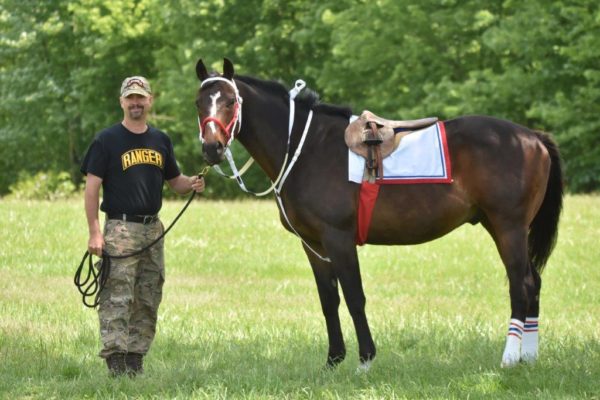
There is considerable anecdotal evidence that supervised exposure of Veterans with PTSD and TBI to horses helps restore a sense of well-being. Nevertheless, an adequate number of controlled clinical experiments are lacking to determine whether equine therapy has any lasting benefits for Veterans suffering from brain injury.
As reported earlier, Dr. Yuval Neria is Professor of Medical Psychology at the Columbia University Medical Center and “Scientific Advisor” to Stand for the Troops (“SFTT”) is leading a clinical study for the Man O’War Project in the hope of developing adding more scientific credibility to the notion that exposure to animals helps Veterans with brain injury.
While Equine therapy is not as widely known within the Veteran community as service dogs, it is yet another non-invasive process to help Veterans recover from the “silent wounds of war.”

What is Equine Therapy?
According to CRC Health, “Equine Therapy (also referred to as Horse Therapy, Equine-Assisted Therapy, and Equine-Assisted Psychotherapy) is a form of experiential therapy that involves interactions between patients and horses.
How Does Equine Therapy Work?
Equine Therapy involves activities (such as grooming, feeding, haltering and leading a horse) that are supervised by a mental health professional, often with the support of a horse professional.
CRC Health goes on describe the therapeutic aspects of Equine Therapy, both during the activity and after the patient has finished working with the horse, the equine therapist can observe and interact with the patient in order to identify behavior patterns and process thoughts and emotions.
The goal of equine therapy is to help the patient develop needed skills and attributes, such as accountability, responsibility, self-confidence, problem-solving skills, and self-control. Equine therapy also provides an innovative milieu in which the therapist and the patient can identify and address a range of emotional and behavioral challenges.
What is the VA’s Position on Equine Therapy?
While acknowledging that there may be some benefits from Equine Therapy, the VA currently does not endorse the programs claiming that there is insufficient “evidence” to support the benefits of the therapy.
How Much Does Equine Therapy Cost?
According to the National Center for Equine Facilitated Therapy (“NCEFT”) “the cost of twice daily feeding, individual grooming and exercise, stall cleaning, specialized supplemental grain, and session staffing (horse handler and therapist), comes out to between $115 and $300 a session, depending on the type of therapy,
Selected SFTT Posts on Equine Therapy
Equine Assisted Therapy for Veterans with PTSD
Equine-Assisted Therapy Seek Veteran Volunteers
Equine Therapy and Service Dogs for Vets
Additional Resources
Equine Therapy from CRC Health (Promotional)
Lessons to be Learned from Equine Therapy
National Center for Equine Facilitated Therapy
SFTT Position
While there currently is a lack of scientific or clinical “evidence” that Equine-Assisted Therapy helps Veterans with PTSD and TBi, there are strong indications that the “bonding” and responsibility required to handle a horse promotes “wellness.” Whether this sense of well-being is sustainable outside of a controlled environment is yet to be determined.
ShareMAR
2018

About the Author:
STAND FOR THE TROOPS ("SFTT") is a 501(c)(3) educational foundation dedicated to safeguarding the physical and emotional well-being of America’s military personnel. Currently, our most pressing mission is to investigate and connect veterans to result-oriented treatments for the Traumatic Brain Injuries (TBI) and Post Traumatic Stress Disorder (PTSD) now triggering so many military suicides.